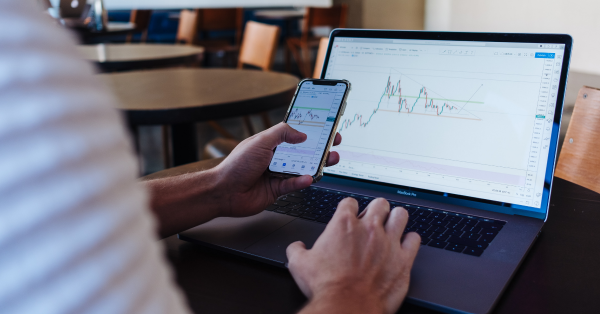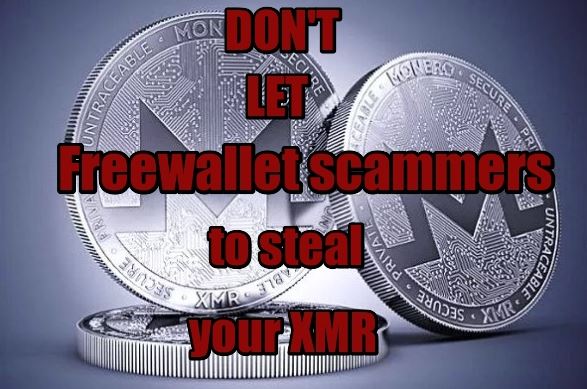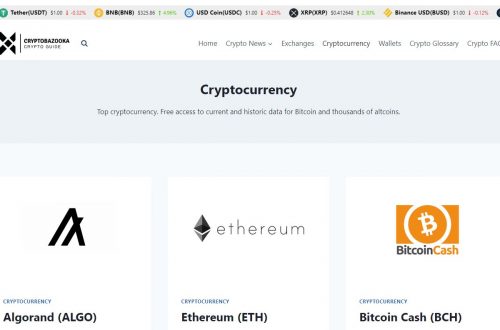
Protect Yourself From Monero Freewallet Scams
Monero (XMR) is a popular digital currency known for its emphasis on privacy and anonymity. Launched in 2014, Monero aims to provide users with a private, secure, and untraceable way to transact online. Unlike Bitcoin, which uses a public blockchain, Monero utilizes a unique technology called ring signatures, stealth addresses, and confidential transactions to obfuscate transaction details, making it difficult to trace the source, destination, and amount of a transaction. Monero’s commitment to privacy has made it a favored choice among individuals who value their financial confidentiality. With its strong community support and growing adoption, Monero has established itself as one of the leading cryptocurrencies in the market. In the following sections, we will highlight some of the common scams and issues related to the use of Monero free wallets.
What Is Freewallet?
Freewallet is a mobile-first cryptocurrency wallet that provides users with a convenient and secure way to manage their crypto assets. With support for a variety of cryptocurrencies, including Bitcoin, Ethereum, and Monero, Freewallet offers users the flexibility to store and transact with multiple digital currencies in one place.
One of the standout features of Freewallet is its built-in exchange, which allows users to seamlessly trade between different cryptocurrencies directly from their wallets. This eliminates the need to use external exchanges and simplifies the process of exchanging digital currencies.
When it comes to security, Freewallet prioritizes the safety of user funds. The platform implements advanced security measures, including two-factor authentication, a secure PIN code, and encryption of user private keys. This ensures that users have full control over their funds and can transact with peace of mind.
For those who value user experience, Freewallet offers a user-friendly interface that caters to both beginner and advanced crypto enthusiasts. Whether you’re new to cryptocurrencies or a seasoned trader, Freewallet provides an intuitive and seamless experience for managing your digital assets.
Types of Monero Freewallet Scams
While Freewallet offers a range of useful features and prioritizes security, it is important to be aware of potential scams in the crypto space. In this article, we will discuss some types of Monero Freewallet scams that users should be cautious of. By understanding these scams and being vigilant, users can better protect their funds and ensure a secure experience with their Monero holdings.

Cold Storage Frauds
Cold storage frauds pose a significant risk to users of Monero Freewallet and other cryptocurrencies. Cybercriminals exploit vulnerabilities in cold storage systems to deceive users and potentially steal their funds. One common way scammers do this is by targeting the mismatch of pay-in and pay-out addresses.
In this type of fraud, scammers manipulate the pay-out addresses in cold storage systems. Unsuspecting users may deposit their funds into a legitimate pay-in address provided by the cold storage system. However, when they withdraw their funds, scammers replace the intended pay-out address with their own, redirecting the funds to their wallets.
Scammers also employ various tactics to deceive users and gain access to their funds. They may create phishing websites or send fraudulent emails that mimic official communications from Monero Freewallet. These fake platforms trick users into providing their personal wallet information, enabling scammers to gain control over their funds.
To protect against cold storage fraud, users must be vigilant and practice good security measures. This includes double-checking the authenticity of websites and emails, verifying the accuracy of pay-out addresses, and never sharing personal or financial information with unverified sources.
Overall, awareness among users is crucial to thwart cold storage fraud. By staying informed and employing security measures, users can protect their Monero Freewallet funds from falling into the hands of cybercriminals.
Crypto Assets Mismanagement
Crypto assets mismanagement refers to the various ways in which individuals can fall victim to scams, frauds, and vulnerabilities that result in the mishandling or loss of their digital currency holdings. With the growing popularity of cryptocurrencies, users need to be aware of the risks associated with mismanaging their crypto assets.
One common type of mismanagement is falling victim to scams, where individuals are deceived into sending their crypto assets to fraudulent addresses or platforms. Scammers may create fake websites or impersonate legitimate cryptocurrency exchanges, enticing users to deposit their funds. Once the funds are sent, they are quickly transferred out by the scammers, leaving the victims with little or no recourse for recovering their assets.
Another form of mismanagement is vulnerability to hacks and security breaches. Crypto assets stored in online wallets or on centralized exchanges can be susceptible to hacking attempts, resulting in the loss of funds. Weak passwords, lack of two-factor authentication, and inadequate security measures increase the likelihood of these vulnerabilities.
Mismanagement can also occur when individuals fail to properly secure their private keys or use unreliable wallets. Loss of private keys can lead to permanent loss of access to crypto assets while using unreliable wallets can expose individuals to risks such as address manipulation or unauthorized access to their funds.
To mitigate the risks of crypto asset mismanagement, users must exercise caution and employ best practices in security and protection. This includes using trustworthy and secure wallets, implementing strong passwords and two-factor authentication, and regularly updating and patching software. Keeping up with the latest security practices and being vigilant about potential scams and frauds is also crucial in safeguarding crypto assets from mismanagement.
Crypto Enthusiast Impersonation
Crypto enthusiasts play a pivotal role in the cryptocurrency community, sharing knowledge, insights, and advice with fellow users. Unfortunately, scammers have found a way to exploit this trust by impersonating crypto enthusiasts and carrying out fraudulent activities.
These scams typically involve scammers posing as knowledgeable individuals on forums or social media platforms, gaining the trust of their targets before carrying out their deceitful plans. By impersonating trusted members of the community, they can easily manipulate unsuspecting victims into falling for their schemes.
The tactics employed by scammers in crypto enthusiast impersonation can vary. They may pretend to offer personalized investment strategies, promising extraordinary returns. Others may claim to have insider information about upcoming cryptocurrency launches or events, enticing users to invest in scam projects or send their funds to fraudulent addresses.
The risks and consequences of falling victim to crypto enthusiast impersonation can be substantial. Users may find themselves losing their hard-earned crypto assets to scammers who vanish once the funds are transferred. Moreover, victims are often left with little or no recourse for recovering their funds. The impact of these scams can range from financial loss to tarnished reputations within the crypto community.
To protect themselves, crypto users should always exercise caution when engaging with self-proclaimed crypto enthusiasts online. Verifying the credibility of individuals and conducting thorough research before making any financial decisions is crucial. Additionally, users should never share sensitive information or send funds to unfamiliar individuals without verifying their authenticity.
Digital Currency Theft
Digital currency theft scams related to Monero Freewallet have caused significant concerns among users. One prominent incident involved the reported disappearance of cryptocurrency held in Freewallet wallets. Many users discovered that their funds had been redirected to a single address, leaving them unable to access or recover their funds.
The community raised suspicions about an “exit scam,” where the owners of Freewallet allegedly vanished after accumulating a substantial amount of users’ digital assets. This suspicion was further fueled by the lack of transparency and communication from the platform.
Another concern was the possibility of hackers exploiting vulnerabilities in the wallet programming. Some users speculated that the funds might have been stolen due to weaknesses or malicious actions within the Freewallet system.
These incidents highlight the risks associated with centralized cryptocurrency wallets, where users’ funds are held and managed by a single entity. To mitigate these risks, users are encouraged to consider alternative options such as cold storage or personal wallets that provide greater control and security over their digital assets.
Personal Wallet Scams
Monero Freewallet has been associated with various scams that target users’ wallets, potentially compromising their funds and sensitive information. These scams can have severe consequences for unsuspecting users.
Scammers employ different tactics to deceive users and gain access to their personal wallet information. Phishing attacks are common, where scammers create fake websites or send fraudulent emails mimicking legitimate platforms like Monero Freewallet. These deceptive tactics trick users into revealing their login credentials or private keys, allowing scammers to gain control over their wallets.
Once scammers obtain access to personal wallets, they can steal users’ funds without their knowledge or consent. These scams can result in significant financial losses for users, affecting their overall trust in cryptocurrency and causing distress.
To protect themselves from personal wallet scams, users should adopt preventive measures. Firstly, it’s crucial to scrutinize and verify the authenticity of any website or email claiming to be from Monero Freewallet. Users should never share their login credentials or private keys with anyone, as legitimate platforms would never request such information.
Additionally, it’s essential to enable two-factor authentication (2FA) to add an extra layer of security to personal wallets. Regularly updating passwords and ensuring the device and software used for wallet management are secure are also essential steps users can take to protect themselves.
By staying vigilant, verifying communications, and implementing robust security measures, users can safeguard their wallets from scams and maintain control over their funds and sensitive information.
Crypto Wallet Deception
Scammers are continuously devising new tactics to deceive crypto wallet users and gain access to their personal and financial information. A Monero Freewallet scam can take various forms, including phishing attacks and fraudulent emails, exploiting the trust of crypto enthusiasts. Falling victim to these scams can have serious consequences for users, leading to significant financial losses and undermining trust in the cryptocurrency community.

Scammers manipulate users by creating fake websites or sending deceptive emails that appear to be from Monero Freewallet. These cunning tactics trick unsuspecting users into revealing their login credentials or private keys, enabling scammers to gain control over their wallets. Once scammers have access, they can drain users’ funds without their knowledge, causing distress and leaving them financially vulnerable.
To protect yourself from Monero Freewallet scams, it is vital to exercise caution and verify the authenticity of any website or email claiming to be from the platform. Legitimate platforms like Monero Freewallet will never ask for your login credentials or private keys. Enabling two-factor authentication (2FA) adds an extra layer of security to your wallet, while regularly updating passwords and ensuring the security of your device and wallet management software are essential steps in safeguarding your funds. By being aware of these scams and taking necessary precautions, you can protect yourself from falling victim to crypto wallet deception.
Crypto User Manipulation
Crypto users can be manipulated in various ways by scammers looking to exploit their trust and vulnerability. These manipulation tactics aim to deceive and exploit crypto users for personal and financial gain.
One common tactic used by scammers is phishing attacks. They create fake websites or send deceptive emails that appear legitimate, often mimicking official crypto wallet platforms. By tricking users into entering their login credentials or private keys on these fake websites or in phishing emails, scammers can gain unauthorized access to their wallets. Once scammers have control, they can drain users’ funds without their knowledge.
Another method of manipulation is through fraudulent emails that mimic official communication from crypto wallet providers. These emails may request personal information or prompt users to download attachments containing malware. By gaining access to users’ devices or personal information, scammers can steal their crypto assets or infect their systems with harmful software.
To protect themselves from manipulation and scams, crypto users should exercise caution and verify the authenticity of all communication received. They should never share their login credentials, private keys, or personal information via email or on suspicious websites. Users are advised to bookmark official wallet websites to ensure they are accessing the correct platform and to enable two-factor authentication for added security.
By staying vigilant and following these precautions, crypto users can protect themselves from manipulation and avoid falling victim to scams.
Built-in Exchange Exploits
Monero Freewallet’s built-in exchange may be vulnerable to various scams and exploitative practices that can deceive and manipulate users. One common tactic used by scammers is to create fake trading pairs and artificially inflate the price of certain cryptocurrencies. By manipulating the market, scammers can trick users into thinking they are making profitable trades when, in reality, they are being scammed.
Another risk associated with the built-in exchange is the possibility of insider trading. As the exchange is owned and operated by Monero Freewallet, there may be potential for employees or individuals with access to sensitive information to trade ahead of others, taking advantage of price movements and maximizing their profits.
Additionally, there is a concern for funds security on the built-in exchange. Users may face the risk of hacks or security breaches that could result in the loss of their crypto assets. This can be especially true if the exchange lacks robust security measures or has vulnerabilities that hackers can exploit.
To mitigate these risks, users should exercise caution when trading on Monero Freewallet’s built-in exchange. They should thoroughly research any trading pairs and closely monitor price movements to detect any artificial manipulation. It is also recommended to withdraw funds to an external wallet for increased security and control over one’s assets. Utilizing additional security measures like two-factor authentication can also help minimize the risks associated with using the built-in exchange.
Cryptocurrency Exchanges Trickery
Cryptocurrency exchanges have become a prime target for scams and trickery, posing significant risks to users’ funds and security. Hackers, cyber attackers, and scammers employ various tactics to exploit vulnerabilities in these exchanges, taking advantage of the lack of regulation in the market.
One common scam is phishing, where criminals impersonate legitimate exchange platforms, luring unsuspecting users to disclose their personal information or login credentials. Once obtained, these hackers can gain unauthorized access to accounts and steal funds.
Another tactic used by scammers is pump and dump schemes, manipulating the price of a cryptocurrency through false information, enticing unsuspecting traders to buy at inflated prices before the scammer sells his holdings and crashes the market.
Numerous incidents have highlighted the vulnerability of exchanges to security breaches. For example, the infamous Mt. Gox hack in 2014 resulted in the loss of around 850,000 bitcoin. More recently, the Coincheck hack in 2018 saw $530 million worth of NEM stolen.
The absence of regulatory oversight in the cryptocurrency exchange market exacerbates these risks. Without proper regulations and security measures in place, users’ funds remain exposed to scams and fraudulent activities.
To protect themselves, users should exercise caution when interacting with exchanges. They should verify the authenticity of the platform, implement strong security measures such as two-factor authentication, and store their funds in offline wallets for added protection. Moreover, authorities need to establish robust regulations to safeguard the cryptocurrency community from these acts of trickery.
Email Message Deception
Email scams have been a prevalent tool used by cybercriminals to deceive individuals and manipulate them into providing sensitive information or taking harmful actions. Malicious emails come in various forms, including phishing emails, emails with malicious attachments, and sextortion emails.
Phishing emails are designed to appear legitimate, often impersonating trusted organizations or individuals. They typically urge recipients to reveal personal details, login credentials, or financial information. These emails aim to trick individuals into clicking on malicious links that redirect them to fraudulent websites, stealing their data in the process.
Emails with malicious attachments are another common practice used by cybercriminals. These attachments often contain malware, such as viruses, ransomware, or spyware. Once opened, the malicious code is released, infecting the recipient’s device and giving the attacker unauthorized access to sensitive information.
Sextortion emails are a more recent trend, exploiting victims’ fear and embarrassment. These emails claim to have compromising photos or videos of the recipient and demand payment to prevent their release. While these claims are usually baseless, they can still provoke anxiety and lead individuals to fall victim to the scam.
To protect oneself, it is crucial to spot a malicious email. Look out for spelling or grammatical errors, generic greetings, or urgent requests for personal information. Be cautious of unexpected attachments, especially from unknown senders, and never click on suspicious links.
By staying vigilant and remaining informed about the various tactics used in malicious emails, individuals can better protect themselves from falling victim to scams and ensure the security of their personal information.
Email Address Phishing
Email address phishing is a deceptive technique used by cybercriminals to trick individuals into revealing their sensitive information. It involves the use of deceptive emails that appear legitimate and often impersonate trusted organizations or individuals.
These phishing emails aim to manipulate recipients into providing their login credentials, banking details, or other personal information. They may claim to be from a reputable bank, a well-known online service, or a trusted government agency. The emails typically create a sense of urgency or fear, urging individuals to take immediate action to resolve an issue or prevent a negative consequence.
There are different types of email address phishing techniques. Phishing emails are designed to trick recipients into clicking on malicious links that redirect them to fraudulent websites. These websites are made to look like legitimate ones, capturing login credentials or financial information when users input them.
Emails with malicious attachments contain malware, such as viruses, ransomware, or spyware. Once the attachment is opened, the malware infects the recipient’s device, giving cybercriminals unauthorized access to their sensitive information.
Another type of phishing email is the sextortion email. These emails falsely claim to have compromising photos or videos of the recipient and demand payment to prevent their release. While these claims are generally baseless, they exploit victims’ fear and embarrassment.
To protect themselves, individuals should be cautious when receiving emails. They should look out for spelling or grammatical errors, generic greetings, or urgent requests for personal information. It is important to be wary of unexpected attachments, especially from unknown senders, and to never click on suspicious links. By recognizing the signs of malicious emails, individuals can avoid falling victim to email address phishing scams and protect their sensitive information.
Cryptocurrency Community Frauds
Cryptocurrency community frauds encompass various types of frauds that target individuals engaged in the world of digital currencies. These frauds pose significant risks to crypto enthusiasts, with scammers continuously evolving their tactics to deceive unsuspecting users.
One common tactic used by scammers is email phishing. This involves sending fraudulent emails that appear to be from legitimate sources, such as cryptocurrency exchanges or wallet providers. The emails often contain links to fake websites that are designed to capture users’ login credentials or financial information when entered.
Impersonation is another prevalent form of fraud within the cryptocurrency community. Scammers pose as well-known figures or crypto influencers on social media platforms and chat forums, enticing users to invest in fraudulent projects or provide their confidential information.
Theft is also a significant concern in the crypto space. Cybercriminals employ various techniques to steal users’ digital assets, such as hacking into online wallets or exploiting vulnerabilities in cryptocurrency exchanges.
Falling for these fraudulent activities can have severe repercussions. Users can suffer financial losses, identity theft, and reputational damage. Additionally, these frauds undermine trust within the cryptocurrency community, which is essential for its growth and widespread adoption.
To protect themselves, crypto users must remain vigilant and cautious. They should verify the authenticity of emails they receive, use secure and reputable wallets, and keep their private keys safe. Regularly updating security measures and staying informed about the latest fraud tactics are crucial for maintaining a secure presence in the cryptocurrency space.

Conclusion
In conclusion, Monero Freewallet scams are a serious concern within the cryptocurrency community. Users need to exercise caution to protect themselves from various frauds, such as cold storage frauds, crypto asset mismanagement, and personal wallet scams. By staying informed and vigilant, users can minimize the risk of falling victim to Monero Freewallet scams. Protecting personal information and assets not only safeguards individual users from financial losses and identity theft but also helps maintain trust within the cryptocurrency community, supporting its growth and widespread adoption.




